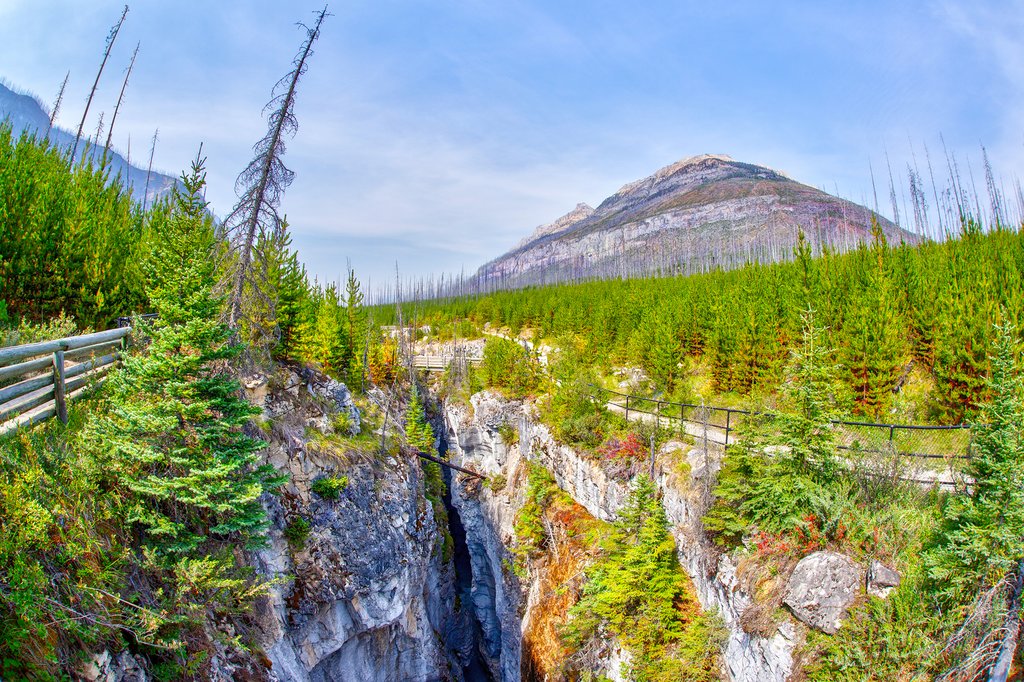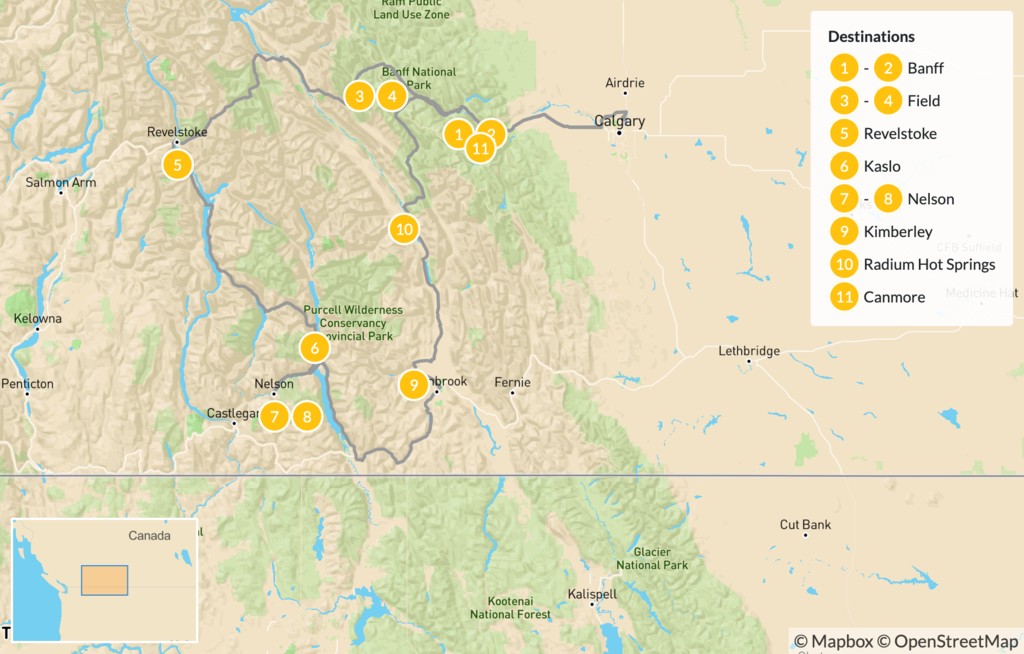Highlights
- Loop through the entire Kootenay Rockies, home to over a dozen hot springs
- Combine stunning mountain scenery with laid-back lakeside communities
- Get outdoors with endless hiking, biking, rafting, and fishing opportunities
- Visit BC's best alpine resorts, popular for both winter and summer activities
Brief Itinerary
| Day | Highlights | Overnight |
|---|---|---|
| Day 1 | Arrive in Calgary, Drive to Banff (2 hours) | Banff |
| Day 2 | Explore around Banff | Banff |
| Day 3 | Banff to Yoho National Park (1 h 30 min) | Field |
| Day 4 | Explore Yoho National Park | Field |
| Day 5 | Yoho National Park to Revelstoke (2 h 30 min) | Revelstoke |
| Day 6 | Revelstoke to Kaslo (3 hours) | Kaslo |
| Day 7 | Kaslo to Nelson (1 hour) | Nelson |
| Day 8 | Explore around Nelson | Nelson |
| Day 9 | Nelson to Kimberley (4 h 15 min) | Kimberley |
| Day 10 | Kimberley to Radium Hot Springs (1 h 30 min) | Radium Hot Springs |
| Day 11 | Radium Hot Springs to Canmore (2 hours) | Canmore |
| Day 12 | Canmore to Calgary, Depart (1 h 30 min) |
Detailed Itinerary
Day 1: Arrive in Calgary, Drive to Banff (2 hours)

Welcome to Calgary, the gateway to the Canadian Rockies! Instead of staying in Calgary, grab any supplies you need and follow the Trans Canada Highway (Highway 1) west toward Banff, a popular base camp for exploring Banff National Park. En route, stop in Canmore for a quick meal and a short stroll. Check out the eclectic PD3 by Blake restaurant where they serve Asian-inspired cuisine from a remodeled 1962 silver double-decker bus.
Banff, a small mountain town located within Banff National Park (Canada's first national park), is one of Canada's most visited destinations and can become quite busy during summer months. You'll find year-round opportunities for outdoor adventures and can access most of the park's iconic sites on a day trip.
Check out the Banff Park Museum for an introduction to the park and its local wildlife. There's also the Banff Gondola which takes you to the top of Sulphur Mountain for a walk along the boardwalk trail (or skip the gondola and hike up for free). From the summit, you'll have great views of the nearby mountains and can also grab dinner at Sky Bistro. Take an evening dip in the hot mineral waters of the Upper Hot Springs Pool (closes 10 pm) before signing off for the night.
Driving time (Calgary International Airport to Banff): 2 hours (79 miles / 127 km)
Day 2: Explore around Banff

Before the crowds arrive, head to the Cave and Basin National Historic Site to learn how the Banff National Park got its start. You'll walk through a dimly lit rock-lined tunnel to see the grotto discovered in 1883 that lead to the park's designation and then enjoy a morning hike choosing from one of the hundreds of options available. Pick up park maps and hiking tips (and bear spray) from the Banff Visitor Center.
For a challenge, arrange a guided climb (three hours) on the Mount Norquay Via Ferrata (Italian for 'iron way') following a protected climbing route as you clip into a series of fixed iron cables. An easier option (and one of the best hikes from the town center) is to take the Bow River and Hoodoos trails. Starting at Gopher Street, hike past the Bow Falls and Surprise Corner to the hoodoos, odd-looking limestone rock spires (6.3 miles / 10.2 km roundtrip).
To satisfy your post-hiking appetite, head to Bear Street Tavern and then take to the water on a one-hour cruise of Lake Minnewanka. If you have the energy to spare, consider renting a canoe or kayak instead. Toward dusk, look for wildlife—beavers, elk, ospreys, and bald eagles—along the shores of tranquil Vermilion Lakes followed by pre-dinner drinks and Mediterrasian tapas at Block Kitchen & Bar. Then hang out with real live cowboys as you two-step the night away at Wild Bill's Legendary Saloon.
Day 3: Banff to Yoho National Park (1 h 30 min)

Fuel up on breakfast at Wild Flour Bakery and proceed to follow the Bow Valley Parkway, a scenic alternative to Highway 1, west out of Banff. Take advantage of the short drive to Field with several notable pitstops, the first to trek along the cantilevered walkways of Johnston Canyon. Considered one of the busiest hikes of the park, come early to beat the mob.
Choose between the 1.5-mile (2.4-km) Lower Falls trail and the slightly steeper Upper Falls route. Allow two to two and a half hours to complete both, yet if there's interest, plan for a picnic at the Ink Pots, five pristine aquamarine-colored pools beyond Upper Falls. It's another 1.7 miles (2.7 km) one way, but worth the effort. Next, snap photos of Storm Mountain from a convenient viewpoint west of Castle Junction and take pause at the memorial plaque farther along the parkway to read about Canada's World War I Castle Mountain Internment Camp.
Close to Alberta's border with British Columbia sits captivating Lake Louise. Admire the turquoise lake and backdrop of chiseled mountain peaks and Victoria Glacier before taking to the trails. If time allows, hike the Plain of Six Glaciers Trail (around four hours), an intermediate-level 6.6-mile (10.6-km) route with an elevation gain of 1,198 feet (365 m). Conveniently, the trail leads to the less-visited Plain of Six Glaciers Teahouse (closes at 5 pm), where you can down thick-cut sandwiches and cups of tea.
Devote time to discover the equally beautiful—if not more rugged—nearby glacier-fed Moraine Lake. Hike the accessible Lakeshore Trail along the deep-teal lake (1 mile / 1.6 km) or the 3.6-mile (5.8-km) Consolation Lakes Trail. (Best to come closer to 5 pm when the crowds have thinned.)
It's only a 30-minute drive to your accommodation in Field, the only town within Yoho National Park, so stay in Lake Louise as long as you like taking Highway 1 into British Columbia when you're ready.
Driving time (Banff to Field): 1.5 hours (52 miles / 84 km)
Day 4: Explore Yoho National Park

Start the day early to cover Yoho's highlights as well as to avoid the throngs of travelers. Drive to Emerald Lake and allow 90 minutes to walk the 3-mile (5.2-km) Emerald Lake Loop. You'll have views of the jewel-hued waters encircled by spruce and firs and the snow-capped Rockies, including the iconic profile of Mount Burgess. Make sure to check out Natural Bridge on your way in or out.
Meanwhile, if it's serious hiking you're after, choose from one or two of over 250 miles (400 km) worth of trails. One of the best hikes in the Rockies is the Iceline Trail, a challenging 13-mile (21-km) roundtrip. It will take you the better part of the day (typically eight hours), but the views alone will supply you the fuel to keep going.
Then there's the wealth of trails that radiate out from picturesque Lake O'Hara with the longest only 4.7 miles (7.5 km). Take the 2-mile (3.2 km) Lake Oesa Trail to climb an elevation of 787 feet (240 m) to overlook the lake. If you're experienced, opt for one of five Alpine routes for a bit of everything: alpine meadows, glaciers, and wooded hillsides.
Note: Private vehicles are not permitted on the Lake O'Hara road. You must either reserve a spot on the Park's Canada shuttle bus (spots fill up months in advance) or walk to the lake (7 miles /11 km).
Chat with a local specialist who can help organize your trip.
Day 5: Yoho National Park to Revelstoke (2 h 30 min)

Get in an early morning hike to Wapta Falls (3 miles / 4.8 km) and then press on toward Revelstoke. Follow Highway 1 to Golden, famous for white-water rafting, where you can take a half-day rafting trip through Class III and IV rapids on the Kicking Horse River or kayak a quieter segment in an inflatable kayak (two hours).
Step aboard the Golden Eagle Express Gondola up Kicking Horse Mountain to enjoy all-encompassing vistas over lunch at the Eagle's Eye Restaurant and then set your watch back an hour to Pacific Coast time and fill your gas tank to take a little detour through Glacier National Park. Stop to check out the Rogers Pass Discovery Center to learn about the significance of Rogers Pass, the area's wildlife, and avalanches and then be sure to traipse the less than a half-mile (400 m) Hemlock Grove Trail through an ancient hemlock forest.
Revelstoke sits on the Columbia River tucked amid British Columbia's Selkirk and Monashee Mountains outside Mount Revelstoke National Park. An outdoor adventurist's (and photographer's) paradise, Revelstoke offers serious powder skiing in winter and an abundance of outdoor summer experiences. Check into your hotel and then see about getting familiar with your surroundings. For a bit of town history, visit the Revelstoke Museum followed by a stroll through town to see 60-some heritage buildings and public art. Cap off the day with a satisfying meal at Woolsey Creek Bistro and linger on the patio.
Driving time (Field to Revelstoke): 2.5 hours (126 miles / 202 km)
Day 6: Revelstoke to Kaslo (3 hours)

Break bread at La Baguette and then stock up on picnic supplies from Le Marché (just around the corner) before hitting the road. Leaving Revelstoke, take your time as you drive south along Upper Arrow Lake, stopping at Blanket Creek Provincial Park to view the 45-foot (14 m) cascade of Sutherland Falls.
At Shelter Bay, you'll cross the lake on the (free) 20-minute Upper Arrow Lake Ferry to Galena Bay, taking in the picturesque views (and maybe enjoying your picnic lunch). Consider stopping at Halcyon Hot Springs for a soak in its mineral-rich healing waters with views of the Monashee Mountains.
Reaching Nakusp, this quaint village is nestled in the foothills of the Selkirk Mountains, best known for its hot springs and scenic location. If you want to stretch your legs, hike the Wrap Around Nakusp Trail, part of the old Canadian Pacific Railway line converted into a walking trail. If you skipped Halcyon, you can also rent a bike and pedal to relax in the Nakusp Hot Springs amid an amphitheater of trees.
Continuing on, head out on Highway 6 toward sleepy New Denver on Slocan Lake, an area with a rich history of silver mining. Stop in at the Silvery Slocan Museum, housed in the 1897 wooden Bank of Montreal building, and drive the five-minutes south to the equally sleepy historic town of Silverton. Don't miss the Nikkei Internment Memorial Center, an informative museum on the site of a World War II-era camp.
A little way east on Highway 31A, find your way to Sandon, the original Slocan Valley boomtown when silver was discovered in the 1800s and British Columbia's best-known ghost town today. Buy a copy of the Sandon Walking Tour Guide inside the historic City Hall and set out on foot to see the highlights.
From there, continue to follow the spectacular route that weaves its way over rugged hills ending in the pretty town of Kaslo at the western shores of Kootenay Lake. An underrated lakeside gem, the rest of the day is yours to take it easy. If there's time, take a late-afternoon hike (0.5 miles / 1 km) to Fletcher Falls (the trailhead is at the top of Fletcher Creek Frontage Road). Or, join a two-hour sunset kayaking tour and end the day with a pint or two of beer from Angry Hen Brewing.
Driving time (Revelstoke to Kaslo): 3 hours (125 miles / 200 km)
Day 7: Kaslo to Nelson (1 hour)

For a unique start to the day, enjoy a guided caving tour of the Cody Caves just 25-minutes north of Ainsworth (be sure to make reservations in advance). Then slip into your swimsuit to warm up in the spring-fed horseshoe-shaped cave lined with stalagmites and stalactites of Ainsworth Hot Springs. Another 15 minutes south in Balfour you can lunch on savory pub grub at the lakefront Dock 'n' Duck restaurant before drinking in the lake and mountain panoramas from the world's longest free ferry ride across Kootenay Lake to Kootenay Bay. The trip one way is 35 minutes.
Back in Balfour, resume the drive to Nelson and today's final destination. Sitting on the extreme West Arm of Kootenay Lake, Nelson is an artsy town of eclectic shops and restaurants and up to 350 restored Victorian-era heritage buildings, some of which creep up a hill that overlooks the park and beach-lined waterfront. Its main drawcard, however, is the surrounding wilderness of the Selkirk Mountains.
Pick up a Heritage Walking Tour brochure from the visitor center and then walk pedestrian-friendly Baker Street, the city's main drag, to admire the historic architecture. Follow the Waterfront Pathway that runs the length of the lakeshore to hang out next to BOB ("Big Orange Bridge"), the iconic Nelson Bridge, from the shade of a bench or spot on the beach in Lakeside Park. And when it's time for dinner, head over to All Seasons Café to sit under the maples lit with twinkling lights for an artful meal of seasonal British Columbian eats.
Driving time (Kaslo to Nelson): 1 hour (43 miles / 70 km)
Day 8: Explore around Nelson
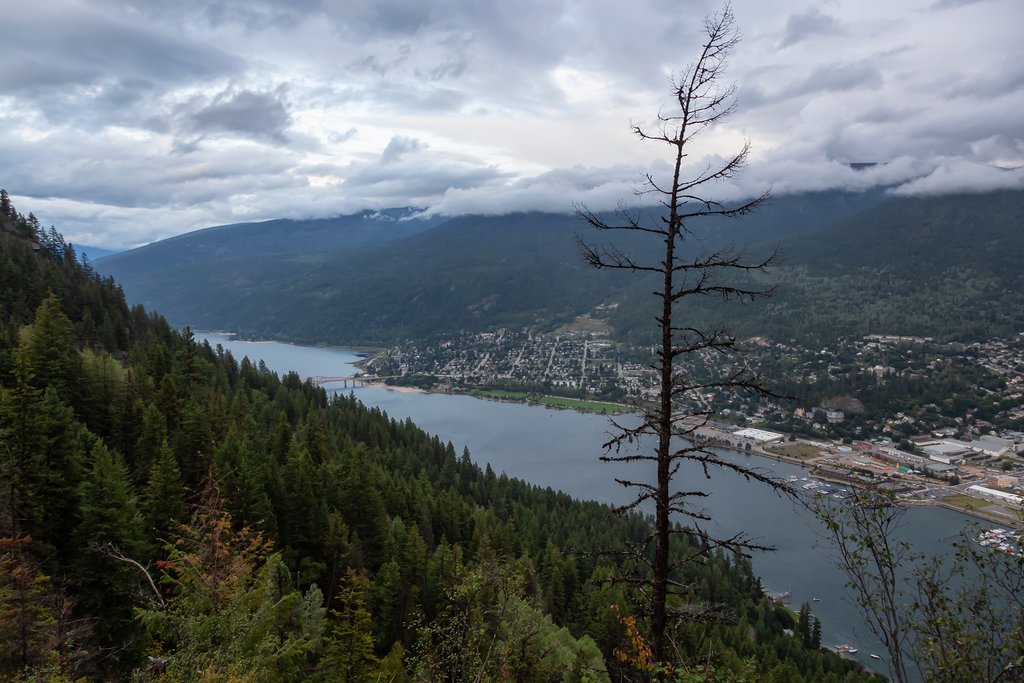
In spring and summer, there are a host of outdoor activities to experience from kayaking and canoeing deep-blue Kootenay Lake to hiking and mountain biking nearby trails. At the same time, the closeby Selkirk Mountains (and magnificent Kokanee Glacier Provincial Park) in the winter provide conditions for world-class skiing and snowboarding. Meanwhile, as a cosmopolitan city, Nelson boasts more restaurants per capita than San Francisco, blocks of specialty and boutique shops, and access to numerous spas.
Today is yours to spend as you like. To satisfy your breakfast needs, watch the world float by over coffee and baked goods from local favorite, Oso Negro. Then consider paying a mid-morning visit to Touchstones Nelson, a museum of local history and art that features modern displays of First Nations, explorers, miners, and the Doukhobors as well as Nelson's contribution to World War I.
If you're looking to get outdoors, head to the visitors center for up-to-date information on road and hiking trail conditions before venturing into the remote wilderness surrounding Nelson. For some of the best trails, drive into Kokanee Glacier Provincial Park. Here you can hike the two-hour summer-only circuit to Kokanee Lake uphill from Gibson Lake (2.5 miles / 4 km). Driving out the way you came in, and before turning west, you'll find Kokanee Creek Provincial Park, a perfect place to plonk your towel anywhere on the half-mile stretch of sandy beach.
Come the evening, make your way to the Hume Hotel to listen to live jazz from your cozy candlelit spot in the elegant Library Lounge after dining on "Viet-Modern" cuisine at Yum Son or wood-fired pizzas at Marzano's.
Day 9: Nelson to Kimberley (4 h 15 min)

Grab a coffee and head east to Kootenay Lake, stopping at Kokanee Creek Provincial Park for a short walk (and to catch a glimpse of kokanee fish spawning upstream in the fall). Take the 35-minute ferry from Balfour to Kootenay Bay and then drive south toward Creston, enjoying the views of Kootenay Lake at the various roadside pullouts along the way.
Arriving in Creston, this orchard town is located on a fertile bench between the Selkirk and Purcell mountains, where you'll find an abundant supply of roadside fruit stands, orchards, and vineyards. With four wineries, the Creston Valley is considered to be Canada’s second wine region after the Okanagan Valley. If you're passing through on a Saturday, stop at their farmers market or visit the Creston Valley Wildlife Management Area, a birdwatchers paradise and wetland conservation area with thousands of migratory birds, guided canoe tours, and self-guided walking tours. Departing Creston, turn your watch ahead an hour as you're now in the Mountain Daylight Time!
In Cranbrook, the Kootenay Rockies' largest city, you'll find great hiking opportunities (especially in the fall) and the Canadian Museum of Rail Travel, which holds the only complete set of rail cars from the luxurious 1929 Canadian Pacific Railway Trans-Canada Limited. Also, don't miss the First Nations-run Ktunaxa Interpretive Centre, located in a former mission and residential school for aboriginal students (call, first, to ensure they're open).
From Cranbrook, it's a short drive north on Highway 95A to Kimberley, an old mining town turned mountain resort where you'll spend the night.
Driving time (Nelson to Kimberley): 4 hours, 15 minutes (160 miles / 260 km)
Day 10: Kimberley to Radium Hot Springs (1 h 30 min)

En route, stop in Fairmont Hot Springs to take a dip in the mineral-rich crystal clear pools that have drawn visitors for over a century. These are some of the largest natural hot spring pools in Canada. At the Fairmont Hot Springs Resort, grab a bite to eat and enjoy the views of both the Columbia and Rocky Mountains. Continue north to Invermere where you can enjoy a number of water activities on Lake Windermere. From here, it's a short, 20-minute drive to Radium Hot Springs.
Day 11: Radium Hot Springs to Canmore (2 hours)
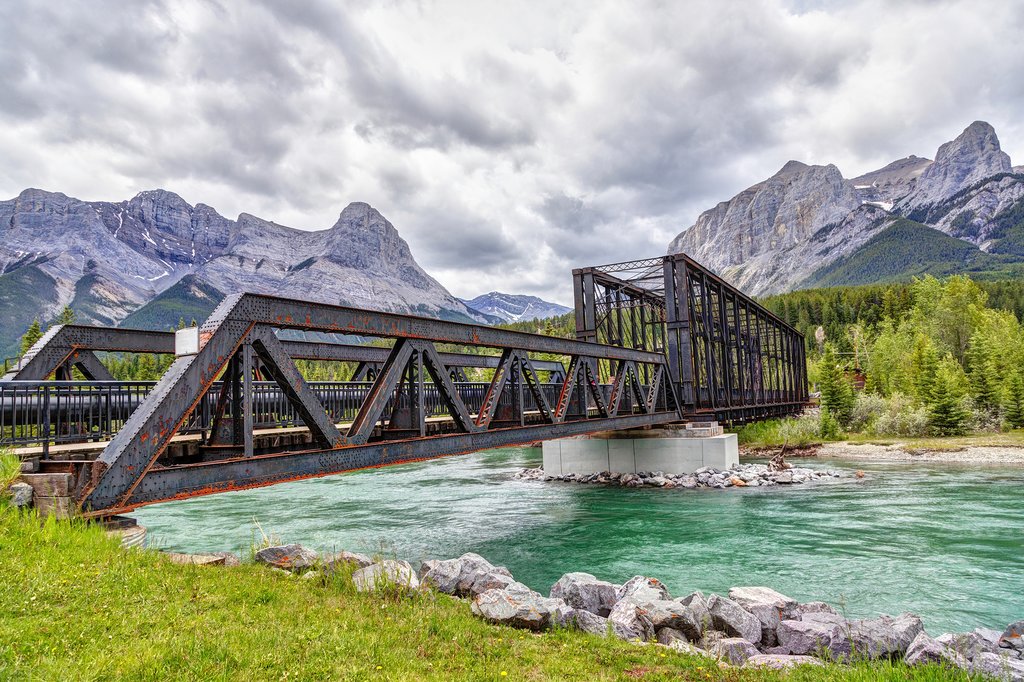
After a morning soak in the hot springs, drive through Sinclair Canyon and Kootenay National Park as you make your way to the Trans-Canada Highway, keeping an eye out for bighorn sheep. At Castle Junction, head south through Banff toward Canmore. There are numerous places to stop and get outdoors on a day hike, especially around Banff and Canmore.
Day 12: Canmore to Calgary, Depart (1 h 30 min)
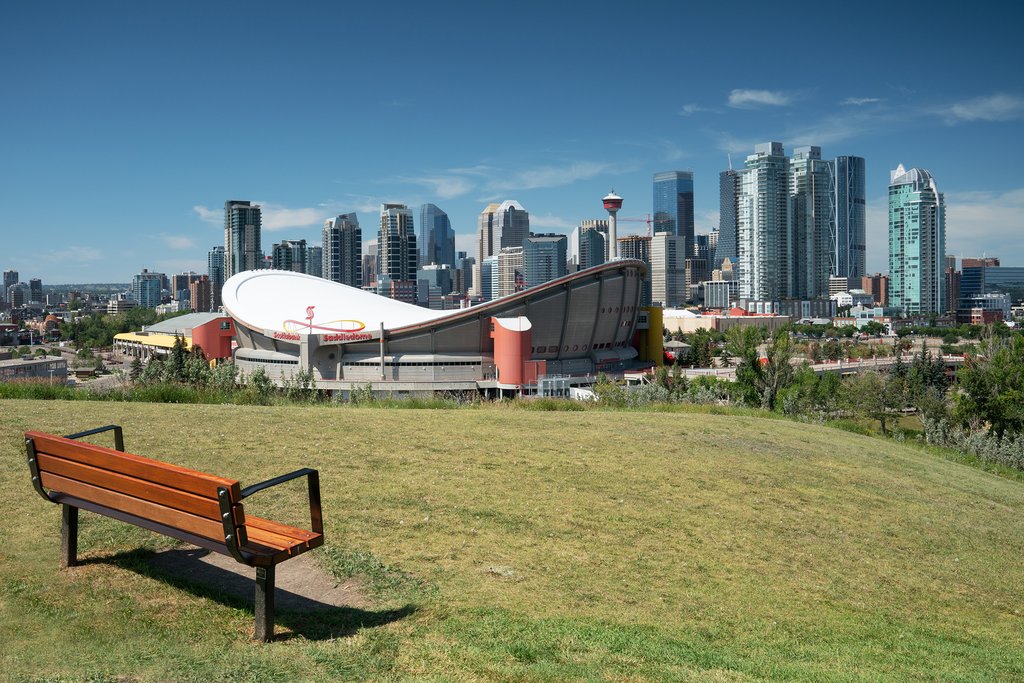
From Canmore, it's a short drive to Calgary's international airport. Be sure to leave ample time in case of traffic and to drop off your rental vehicle. En route look for signage leading you to the airport.
Driving time (Canmore to Calgary International Airport): 1 hour, 30 minutes (75 miles / 120 km)
